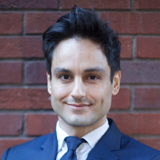Young ophthalmologist Andrew Scott, MD, recently assumed leadership of the European Society of Ophthalmologists' young ophthalmologist committee. In interviews with YO Info and colleagues at SOE 2015, he talks about his passion for ophthalmology and lessons he learned from outgoing chair Anthony Khawaja, MBBS.
 Location: London, United Kingdom
Location: London, United Kingdom
Years in practice: Final-year ophthalmology resident (year 7). I did my residency in North London and completed most of my training at Moorfields Eye Hospital London.
Training: Currently doing a glaucoma fellowship at Moorfields Eye Hospital. (In the United Kingdom, a fellowship year is incorporated in the seven-year residency program.)
YO Info: Why did you become an ophthalmologist?
After medical school I remember being drawn to the craftsmanship and decision-making skills involved in surgery. However, I also loved the challenge of making a diagnosis. On the first day of my ophthalmology rotation during internship, I remember observing an ophthalmologist diagnosing diabetes just by looking at the fundus. I also remember witnessing the immense gratitude of another patient whose life was transformed following successful cataract surgery in her only eye. It immediately occurred to me that I could make a huge difference to people’s lives by choosing a career in ophthalmology, which combined both the medicine and surgery I was equally attracted to.
What does a typical day look like for you?
My typical day starts at 7.30 a.m., seeing pre- or postop patients. I have three theater sessions a week, which usually consist of complex cataract surgery, trabeculectomies and aqueous shunt insertions. I do most of the surgery myself, supervised by a consultant. I also supervise more junior residents for cataract surgery. We always find time to reflect on our surgery and get feedback from each other.
I also do five clinical sessions a week, which are usually very busy but very challenging and rewarding. I work in a consultant-led team led that includes around five ophthalmologists of varying grades, four nurses and about two optometrists. Clinics are highly specialised but run alongside several other specialised clinics. It is very easy to get an opinion from other subspecialities should you need one. There are always medical students or doctors on electives attached to our firm and I really enjoy teaching them.
Wednesday morning is dedicated to teaching and we usually get a variety of external and internal speakers, as well as case discussions and journal clubs by residents. These sessions are of high educational value. I am usually exhausted by the end of these busy days, but try to squeeze in a gym session in the evenings and catch up with emails and other non-clinical duties.
What do you like most about the organization/health system/region where you practice?
I feel very privileged to work at Moorfields Eye Hospital. It is the oldest and probably the largest eye hospital in the world and has acquired a reputation of excellence over the years. It is always at the forefront of research and advances in ophthalmology. The work environment is great, with highly skilled and highly knowledgeable consultants who are all down to earth and willing to teach, help you reflect on your practice and encourage you to develop. At Moorfields you also get lots of fellows from all over the world. It is such an enriching experience to work alongside people from all sorts of backgrounds and cultures.
Because Moorfields is part of the National Health Service, clinical care is free at the point of delivery. This allows us to put patients and their safety and wellbeing at the center of every decision we make.
What will you take from Anthony Khawaja’s example as you assume this new role?
I will have big shoes to fill. One thing I will take from Anthony Khawaja’s example is his ability to understand the strengths and aspirations of each committee member, enabling him to share responsibilities accordingly. He also is very good at motivating his team and leads by example. As I assume my new role, my first task will be to expand our SOE YO committee. I will certainly take Anthony’s example to share the responsibilities of our new committee the best way I can.
What’s the hardest thing you’ve had to do?
Leaving my country of birth to pursue a career in ophthalmology in the United Kingdom. I come from a very small sunny island in the center of the Mediterranean Sea, called Malta. I had a very comfortable life, surrounded by family and close friends. Moving to a colder climate, different culture and way of life and having to overcome several hurdles with no friend and family support was certainly tough. However on looking back, I now think it was all worth it in the end.
What accomplishment are you most proud of?
My PhD in experimental ophthalmology awarded by University College London. This was laboratory-based research investigating modulators of angiogenesis using animal models and transgenic mice. Having never set foot in a laboratory before, I am very proud of the progress I made during this time and my achievements. I believe it has made me a better doctor by improving my critical appraisal skills of the scientific literature, as well as making me more inquisitive about mechanisms of disease. It also helped me develop skills such as people, time and resource-management skills, public speaking and IT skills.
What do you find fulfilling about your career in ophthalmology?
The ability to make a huge difference to the quality of life of our patients. Just taking a cataract out can radically transform people’s lives. It is so gratifying when you can help people drive again, read again or enjoy the environment surrounding them. It is also rewarding to help people prevent blindness, like when I manage glaucoma patients. I am very grateful for the privilege to work in this speciality.